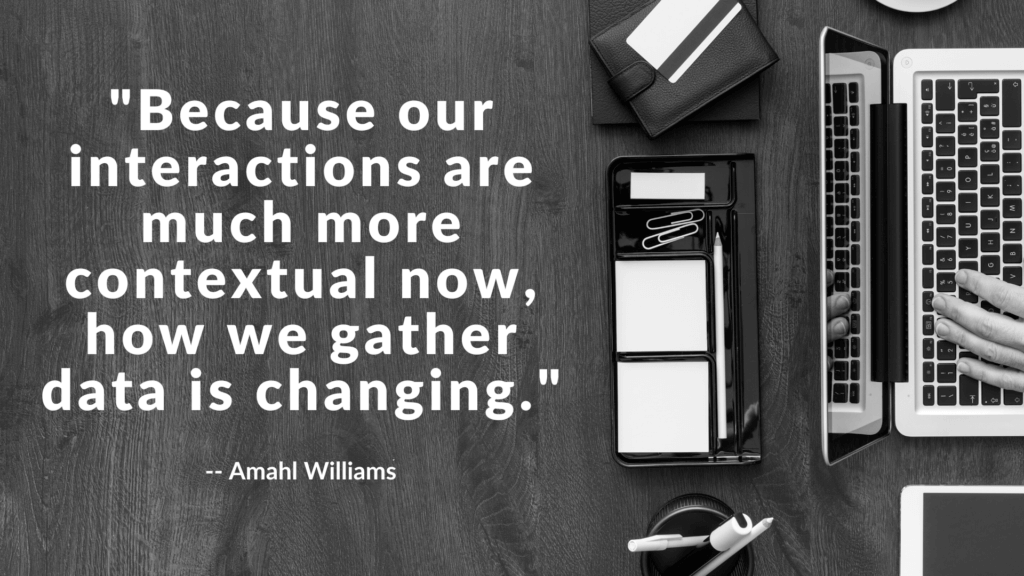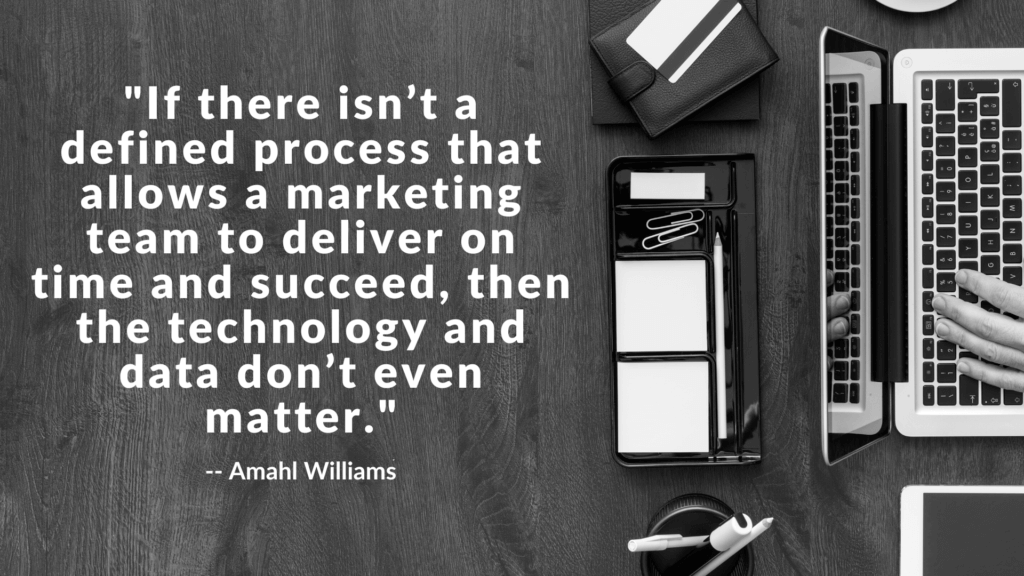New Series: Amahl Williams Takes Us Inside the Mind of a Marketer
Over the last several years at nDash, we’ve met, conversed, and collaborated with some of the brightest minds in marketing. It recently dawned on us that, although these interactions have been a goldmine of knowledge for us personally, they did nothing for our audience.
What a shame!
Here to change that is our new series: Dumb Questions for Brilliant Marketers. Our good friend Amahl Williams, former VP of Smarketing at Pluris Marketing and current partner at the Reveal Group, is kicking off the series.
We’re chatting about data-driven marketing, sales-marketing alignment, obscure NFL punters, beating kids in video games, and much more.
As we further develop this series, we’ll continue to share an interview with a well-known marketing thought leader occasionally. We’ll ask them semi-intelligent questions, followed by some genuinely dumb ones. (Hence the title.)
Let’s get into our discussion with Amahl Williams – enjoy!
nDash’s Discussion with Brilliant Marketer: Amahl Williams
nDash: Few would argue that marketing is increasingly becoming more data-driven. Do you see this trend reversing eventually? Will marketers get “data fatigue” and start to tune this out? As someone who lives and breathes data-driven marketing, we’re curious to know your thoughts.
Amahl Williams: What people truly want is not data but the actionable insight derived from the data. Because there are north of 8000 platforms available to marketers now, they have access to the data they’ve ever wanted. But, there are also more platforms available than they have the time and budget to test.
What’s getting tricky for marketers is knowing which platforms to test that will provide them with the intel needed for their marketing teams. They can take that intel and wrap up all the data to share with their supervisors. That data can prove to them that the marketing budget is worth it.

So, do you see any changes in data collection?
Amahl: I think the Amazon Echo’s arrival is definitely going to change things. Devices like Echo are taking data to a new level, so much so that it’s creating a new channel.
Let me give you an example. My son touches all screens that he sees. He believes he should touch them all because of his interactions with his iPad and iPod. It’s very much like in that Steve Jobs movie where his daughter used the Mac, and Steve Jobs started doing epic Steve Jobs things just by looking at that movement his daughter is doing. My son doesn’t know how to play with the toys any other way.
The aging market is tech-averse because of the interface of the platforms we grew up with. Brands think that if their audience loves them, they’ll go on Facebook and find them. And now, Alexa will take us to the next level and reach us in the car, where we spend a lot of time in our daily life.
Because our interactions are much more contextual now, how we gather data is changing. We have a more genuine interaction with the platforms because our fear of doing something new dissipates when all we have to do is touch or talk to something. This also broadens our interactions into different spaces, so it’s more than just home or office; now, we can interact in transit.
Where does this leave us, the marketer, now?
Amahl: Well, because tech adoption will be driven by activity and behavior, if marketers are willing to pay a premium, they’ll now be able to have information about their potential customers while they’re commuting.
So now, and I am being a futurist here, you’ll be driving, and your mobile device won’t just know that you’re moving. It will also be able to recommend attractions along the way. For instance, it may ask, “Do you want a sandwich?” “Do you want something to drink?” “Do you want to catch a movie at 7?” But now, this will be appropriate and not creepy because it’s coming from someone we trust, Alexa.
And, as marketers, I know that we’re going to want to be able to tap into that data. So, to circle back to your first question, as marketers, it’s not that we have to become more data-driven. We need to know which platforms to use and which to leave off.

So, do you believe that the root cause of ineffective marketing is not a lack of actionable data but a lack of execution?
Amahl: You should inform your marketing strategy with analytics, not data. Even with over 8,000 marketing platforms, if people don’t know how to use them to improve their business, then what’s the point?
If there isn’t a defined process that allows a marketing team to deliver on time and succeed, then the technology and data don’t even matter. Execution is the strategy, the strategy is the plan, and the lack of execution is a result. That result is either the tech not being embraced by the people or the process not being clearly defined and understood by the people using the tech.
If you buy tech first and then create a strategy, that will never work. If you buy tech and then train people, but you still don’t have a process, that’s when you have this weird, “Hey, I don’t know what’s going on with my job, so I’m going to keep my options open,” type of atmosphere in the company.
What most companies don’t want to spend time on is the process. But you need to define the process. And after you define the process, then you can figure out where the human error will occur, and then you can figure out what tech you can utilize to automate that part of the strategy to avoid human error.
Do you have any tips for doing this?
Amahl: Business comes first: make more money. This comes by reducing the cost of the sales and marketing teams, so it’s important to know which types of people you need on those teams and what they should be doing, followed by what technology they are going to need to meet those deadlines and processes set in place.
The strategy should be informing the business units on how to be successful; this way, the individual business units are not defining their own individual success because that just leads to chaos.
This then leads us back to what “data-driven marketing” truly means.
Amahl: Exactly. On a granular level, it means that by removing human error, you never miss another delivery window, you get time back in your marketing months so that you can spend more time on being strategic, and it reduces your time to market.
Marketers lack actionable data because they cannot execute; their execution is not informed by a strategy. And then you end up spending that entire company meeting trying to agree on what that meeting is about. And that’s not savage.
Ah, yes, I have been in those. Those are awful.
Amahl: Yes. It hurts. It hurts so much.
So, who do you think least understands the role of marketing?
Amahl: Marketers.
Not at all the answer that I was expecting. Could you elaborate on that a bit more?
Amahl: Well, I wrote a blog about it. Ha. But really, it’s least understood by the marketer, and this is why. If you’re a marketer, you truly understand how much budget you need, what squad you need to get it done, and what tech you need before going into any job. You earn the rite of passage in marketing through your planning and presentation before entering any marketing position.

So if you’re going into a new marketing position before you even entertain the thought of taking over that marketing department, what should you be thinking of?
Amahl: The first time I inherited a marketing organization, I was given a budget with restraints and limitations and a lack of appetite to outsource certain things that we did until I proved the cost and scale model.
As a marketer, you need to be able to come in with a spreadsheet that outlines the next 24 to 36 months of what your dating life with that organization will look like. You should be able to talk about the strategy, what it’s informed by, and know who the folks are that are going to make it happen. If you’re a marketer and you don’t go in and say things like this, then you won’t be successful.
You should know the company’s budget before you start and if that budget will be able to accommodate your strategy. You need to know what victory looks like in that company and what resources you need to make it happen. And you need to know it ahead of time, before the interview, not after you are already in that company and have that role.
And once you’re in the company, what then?
Amahl: Document everything that you are doing within that marketing department. That way, when someone comes to you and asks you for an interview, you can say:
“This is what the next three years of our lives are going to be like together based on your organization and industry. Here’s what I can do, what I can’t do, and how much it actually costs.”
And then, when you come in, not only does your base rise, and you’re making much more money, but your quality of life in that organization rises.
So when I say that the role of marketers is least understood by marketers, I mean that we want to grow, we want to advance our overall careers. Still, sometimes we don’t always understand how to articulate that when we go into these organizations.
Got it. Many marketers, it seems, believe that the company’s CEO is who most misunderstands the marketer’s role.
Amahl: It’s not misunderstood by the CEO. The CEO is just looking at it through a different lens. The CEO wants to hear about the cost of sales and marketing going down and revenue going up. That’s not a miscommunication thing. That’s just the nature of business.
So when a marketer states that they “can’t get the budget,” it’s because they couldn’t define it. You need to clearly articulate why you need that budget and how the CEO and CFO will justify that budget’s cost.

You’re quite active as a marketing mentor, particularly in your alma mater. You also hire your fair share of aspiring marketers. In your experience, how well are colleges and universities preparing students for the reality of modern marketing?
Amahl: American talent is predicated on apprenticeship, not from throwing someone a piece of curriculum and asking them to read a few chapters. I’ve noticed that not enough marketers are spending enough time on college campuses unless it directly benefits their resumes.
Now I’m not saying that I want to start a grassroots movement around making awesome marketers. Still, I’m saying that if the only time you go on campus is when it directly benefits you, you’re never going to find the talent you’re looking for.
But let’s say a marketer isn’t able to spend time religiously on campus vetting future marketers. What should they look for?
Amahl: I find that the best people in marketing typically do not have a degree in marketing or are classically trained in marketing. Their training is an art – English, science, psychology, and sociology. I think that if marketers look at their resumes, they’ll realize that they’re not a marketer. They’re a marketing practitioner.
Which then comes down to what makes up a marketer? I believe that it’s someone that can write, in the King’s English, because as soon as you see that unintelligible sentence, that brand disappears. A marketer needs to be able to read, write, think, and do math because you have to be able to pull those budgets together.
And now for the Dumb Questions:
Who’s recently viewed your LinkedIn profile, and what the hell do they want?
Amahl: Oh man, how much shade do I want to throw at them? How do I choose? In the last 90 days, 648 people have looked at my profile. Someone wanted a job, another was a teammate who wanted my contact list, and someone else was from my class and wanted to go and get a beer. So he’s probably thinking of some way to throw shade at me. This marketing expert probably saw my comment about the Women’s March – I’m very active in social activism; I don’t run or hide from that because of humanity.
Favorite movie that you’ve never watched?
Amahl: “The Birth of a Nation.” I need to watch that. I’m going to lose some major cred if I don’t. But that’s some heavy content, like what day do you choose?
At what age is it okay to pummel your kids in video games?
Amahl: Birth. Listen, he’s got to learn.
Who’s your second favorite NFL punter of all time?
Amahl: The punter from the Giants is my first; he’s jacked. But I like the swag of the young man from Oakland; his name is Marquette King. But he needs to learn to use his inside voice; you’re on the team, but know your role.
What’s it like being the only person on LinkedIn with “Dragon Slayer” as a former title?
Amahl: Liberating. Titles are bullshit. I don’t think they’ve earned it. And I think that people are slave-ish to them for all of the wrong reasons. I took my title off my business card so that I could see how people treated me organically. I don’t want them to treat me like something because they think they should be treating me that way. If my title is the only thing that draws you towards me, then I don’t know if I actually want you around.
I recently purchased www.amahlwilliams.com. Know anyone who might be interested?
Amahl: The haters. Final answer.
 About Amahl Williams:
About Amahl Williams:
Amahl Williams has spent his career developing complex integrated marketing and business development programs for large retail, media, and telecom organizations. According to his LinkedIn profile, he’s a classically trained marketing executive with a background in monetizing new and adjacent technology. Specialties include design thinking, end-to-end quality, return on change, time-to-value, go-to-market strategy, ROM architecture, and RPA+IPA technologies Blue Prism, UiPath, and AA.
